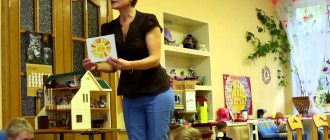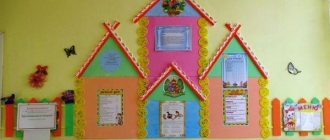I don't like you...
It also happens that everything seems to be fine, but you just don’t like the teacher. “She’s kind of indifferent,” “she never really says anything,” “she’s always dissatisfied with everything”—such complaints can often be heard from parents. Of course, we are all human, and a person may simply cause us antipathy. What to do in this case? There seems to be nothing to complain to the manager about, but taking your child to kindergarten with a person who annoys you is unpleasant. You have two options - try to change kindergarten or accept it. Well, after kindergarten the child will go to school, and where is the guarantee that all the teachers there will be pleasant to you? Moreover, children go to kindergarten not only to the teacher. Even in the nursery (what can we say about the junior, middle and senior groups) they go to their friends. I know a case when children categorically refused to move to another kindergarten from a not very kind teacher, whom everyone was afraid of, because their friends went to this group.
And finally, a little more. Sometimes reviews of kindergartens resemble a program about intrigue, scandals and investigations. Moms and dads spy on teachers, eavesdrop on what is happening in the group, look for any little thing to find fault with the teacher, because their best child deserves only the best teacher. For a scratch, they, at least in words, threaten to “break” or “meet in a dark alley” this “praise,” “someone else’s aunt,” who will never love the child. But a kindergarten teacher shouldn’t love children as if they were their own. For this, the child has parents. The teachers do their job, the job is very difficult and, in my opinion, worthy of great respect. And if the parent is negative, most likely, according to the law of attraction, he will receive it. Kindergarten is neither heaven nor hell for a child, it is the same stage in his life as school, college, and the ability to build correct relationships with people working with our children largely determines how their lives will develop in the future. kindergarten.
Irreconcilable differences?
What can most often become a reason for misunderstanding and dissatisfaction? From the parents' side it is:
- There is little activity with the child in the garden;
- do not create the proper conditions to strengthen his health, walk too little (or too much), do not ventilate the group or ventilate the group too often, dress too lightly (warmly);
- cannot find an approach to the child;
- use non-pedagogical methods in relation to the child (moral and physical punishment);
- they don’t look after the child well (they didn’t wipe their sniffles, didn’t immediately change their panties, didn’t change their dirty T-shirt);
- the child is forced to eat or, conversely, they do not make sure that he eats everything;
- restrict the child’s freedom (one mother complained to me that her child was forced to lie in the crib during quiet time; she thought that teachers should just play with the child since he did not want to sleep);
- they often punish and complain about the child if his behavior does not suit the teachers;
- they do not take action against hyperactive and aggressive children, especially if their child has been bitten (which often happens in nurseries), hit, or scratched.
And although this list is far from complete, it shows that parents make a huge number of demands on the kindergarten and the teacher in the first place, and often quite contradictory. And this is understandable. Each family has its own educational system, and what is good for one child is categorically not accepted by other parents. Some demand that the child return from a walk clean, others are indignant that the teacher does not allow the child to jump and climb wherever he wants, someone asks that children not be walked when it’s cool outside, someone, on the contrary, goes complain to the manager that the children are kept in a group instead of going for a walk. It happens that parents come and ask to be stricter with their child, while others are ready to write complaints to the education department if they find out that their voice has been raised against their child.
Of course, educators also have their own list of complaints against parents:
- treat the kindergarten staff with disrespect and may reprimand them in a raised voice in front of the child;
- they forget to pay receipts or pay fees for additional classes on time;
- they forget to put a change of clothes in the children’s locker;
- children are brought to kindergarten completely unprepared (without basic self-care skills, not accustomed to the kindergarten’s daily routine);
- children are picked up late;
- they raise their children poorly (they pamper them excessively or, conversely, do not pay enough attention to the child; usually it is very difficult to find an approach to such children);
- make unreasonable claims to the staff, find fault with little things.
Participation of parents in the life of kindergarten
The processes of democratization in the education system, its variability, and innovative programs have led to the need to find solutions to the problems of interaction between a preschool educational institution and the family, and to create conditions for improving the pedagogical culture of parents. Strengthening and developing close connections and interaction between various social institutions, kindergarten, family, and the public provide favorable living conditions and upbringing of the child, forming the foundations of a full-fledged, harmonious personality. The joint activities of the family and our preschool institution are based on the following principles: The idea of the relationship between public and family education, as well as the mutual responsibility of teachers, parents and the public, is reflected in a number of regulatory documents, including. They are obliged to lay the foundations for the physical, moral and intellectual development of the child’s personality at an early age.
Registering a child for kindergarten on the State Services Portal. The full upbringing of a preschooler occurs under the simultaneous influence of the family and the preschool institution.


